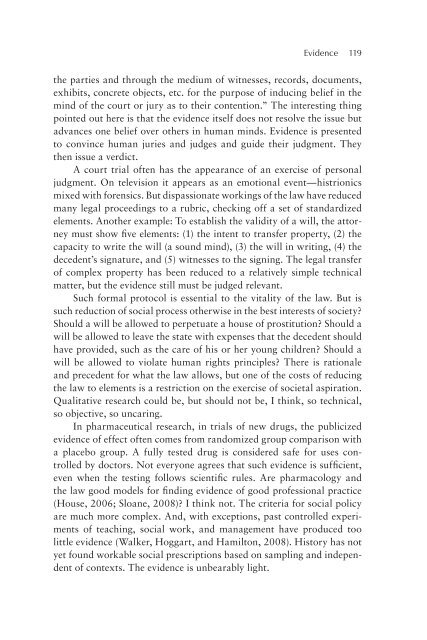How Things Work - Doha Academy of Tertiary Studies
How Things Work - Doha Academy of Tertiary Studies
How Things Work - Doha Academy of Tertiary Studies
Create successful ePaper yourself
Turn your PDF publications into a flip-book with our unique Google optimized e-Paper software.
evidence 119<br />
the parties and through the medium <strong>of</strong> witnesses, records, documents,<br />
exhibits, concrete objects, etc. for the purpose <strong>of</strong> inducing belief in the<br />
mind <strong>of</strong> the court or jury as to their contention.” The interesting thing<br />
pointed out here is that the evidence itself does not resolve the issue but<br />
advances one belief over others in human minds. Evidence is presented<br />
to convince human juries and judges and guide their judgment. They<br />
then issue a verdict.<br />
A court trial <strong>of</strong>ten has the appearance <strong>of</strong> an exercise <strong>of</strong> personal<br />
judgment. On television it appears as an emotional event— histrionics<br />
mixed with forensics. But dispassionate workings <strong>of</strong> the law have reduced<br />
many legal proceedings to a rubric, checking <strong>of</strong>f a set <strong>of</strong> standardized<br />
elements. Another example: To establish the validity <strong>of</strong> a will, the attorney<br />
must show five elements: (1) the intent to transfer property, (2) the<br />
capacity to write the will (a sound mind), (3) the will in writing, (4) the<br />
decedent’s signature, and (5) witnesses to the signing. The legal transfer<br />
<strong>of</strong> complex property has been reduced to a relatively simple technical<br />
matter, but the evidence still must be judged relevant.<br />
Such formal protocol is essential to the vitality <strong>of</strong> the law. But is<br />
such reduction <strong>of</strong> social process otherwise in the best interests <strong>of</strong> society?<br />
Should a will be allowed to perpetuate a house <strong>of</strong> prostitution? Should a<br />
will be allowed to leave the state with expenses that the decedent should<br />
have provided, such as the care <strong>of</strong> his or her young children? Should a<br />
will be allowed to violate human rights principles? There is rationale<br />
and precedent for what the law allows, but one <strong>of</strong> the costs <strong>of</strong> reducing<br />
the law to elements is a restriction on the exercise <strong>of</strong> societal aspiration.<br />
Qualitative research could be, but should not be, I think, so technical,<br />
so objective, so uncaring.<br />
In pharmaceutical research, in trials <strong>of</strong> new drugs, the publicized<br />
evidence <strong>of</strong> effect <strong>of</strong>ten comes from randomized group comparison with<br />
a placebo group. A fully tested drug is considered safe for uses controlled<br />
by doctors. Not everyone agrees that such evidence is sufficient,<br />
even when the testing follows scientific rules. Are pharmacology and<br />
the law good models for finding evidence <strong>of</strong> good pr<strong>of</strong>essional practice<br />
(House, 2006; Sloane, 2008)? I think not. The criteria for social policy<br />
are much more complex. And, with exceptions, past controlled experiments<br />
<strong>of</strong> teaching, social work, and management have produced too<br />
little evidence (Walker, Hoggart, and Hamilton, 2008). History has not<br />
yet found workable social prescriptions based on sampling and independent<br />
<strong>of</strong> contexts. The evidence is unbearably light.

















